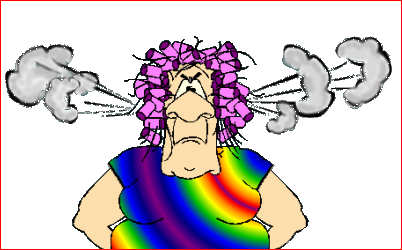|
ESL Forum:
Techniques and methods
in Language Teaching
Games, activities
and teaching ideas
Grammar and
Linguistics
Teaching material
Concerning
worksheets
Concerning
powerpoints
Concerning online
exercises
Make suggestions,
report errors
Ask for help
Message board
|
ESL forum >
Grammar and Linguistics > Just curious about English grammar!
Just curious about English grammar!
|
|

Olindalima ( F )

|
Hello, to all of you,
Just grammar... by no means hurting no one, obviously, but by no means defending my lady, as I am also Portuguese, as Ana. This posted, you all know I am non native.
Even so, I would like to point something else - the sentence as it was written by Ana doesn�t hurt my deep feelings and I would like to know what other people, mainly native speakers, have to say about what I am about to point. Well, it goes like this:
I smoke, a simple present, refers to an action which is frequent; so, if I smoke, this means it is a daily action, or more than that, or less than that... I may smoke only when I am at home, when I need to relax, after dinner, just one cigarette, but in all these situations this has a certain frequency, so the simple present goes well in this first part of the sentence, in my opinion. Do you agree?
Then, again in my opinion, I finish the sentence, clarifying since when I have this "terrible" habit. May be the punctuation could be more clear, this way " I smoke ... since I was 12 ".
Now, in these cases I always love to change to similar situations, to check how things can change if the words involved become quite different.
Try this:
"I break my leg since I was twelve " - silly ?
And if what I mean is just this : When I was 12 I broke my leg, for the first time, and since then, some now and then, I keep on breaking this same leg, so breaking my leg is a tradition for me, since I was 12.
I don�t agree or disagree, just leaving some more ashes in the fire,
Hope you understand me
|
21 Oct 2008
|
|
|

Zora

|
The error is in the usage of "since" as this can only be used with Perfect tenses.
i.e.
He has been smoking since he was 12.
He has smoked since he was in high school.
He had been smoking since he was a young boy.
I honestly think that Ana had a "mistype" here since the "since" rule is very basic grammar and most teachers know this off by heart.
Cheers,
Linda
|
21 Oct 2008
|
|
|

Zora

|
Sorry... didn�t see this Olindalima ... but...
"I break my leg since I was twelve " - silly ?
And
if what I mean is just this : When I was 12 I broke my leg, for the
first time, and since then, some now and then, I keep on breaking
this same leg, so breaking my leg is a tradition for me, since I was 12.
The above is grammatically incorrect, it should be (for example):
"I have been breaking my leg (every year, off and on, etc) since I was twelve "
When I was 12 I broke my leg, for the
first time, and since then, some now and then, I keep on breaking
this same leg, so breaking my leg HAS BEEN a tradition for me, since I was 12.
|
21 Oct 2008
|
|
|

wolfy

|
|
Hello,
I�m a native speaker too (UK). �It is incorrect although this "I smoked since I was ..." might be acceptable in spoken english. |
21 Oct 2008
|
|
|

Vickiii

|
Hi Olinda,
You are correct in that we use the term �smoke� as a habit or regular activity. "Yes I smoke"  <hehehe> <hehehe>
When we use it in the past with since - we do need to change it though.
since I was 12, I keep breaking my leg...
I have been breaking my leg regularly since I was 12.... Gosh that would be terrible for you!!!
|
21 Oct 2008
|
|
|

Logos

|
|
Don�t matter whatever grammar book or usage you want to look at �I smoke since I was twelve�. aint not proper English. You should write it like it is meant to be spoked - like wot I does.!!!!! |
21 Oct 2008
|
|
|
|
|

Ana B

|
|
Oh my God! Thanks for the attention!
This is my first time here on the forum...
Though I�m not a native speaker, I actually know what the correct form is... I agree with all your recommendations. I think we learn when we listen to other people�s comments/opinions. I�m glad you noticed my work. I think it was a positive point.
Anyway, this was freely adapted from another text/source some years ago and it�s supposed to imitate teens� spoken English! How many songs and texts we come across have those types of mistakes? It�s just a matter of calling our students� attention for the fact.
You�re free to change it if you feel hurt or offended by spoken language!
By the way� I don�t want to be mean but: how many fellow-colleagues in this wonderful site share their worksheets full of mistakes and even use their mother tongue in the descriptions?
Thanks Vitor and thanks all the contributors! I�m glad to be a member of this community!
|
21 Oct 2008
|
|
|

frenchfrog

|
|
The thing is, my students sometimes tell me "But I heard it when I was in England, bla bla bla" and then I usually answer �Well, this is not proper English even if you heard it in England!� But I also know that English is a fast-evolving language (it is really evolving faster than French, for instance; this is because we have the Acad�mie Fran�aise controlling everything to the point of ridicule sometimes...), so I really wanted to know if �I smoke since..." was acceptable. From all your answers, it is obvious it is not!! Thank you for being so clear!!!
Frenchfrog |
21 Oct 2008
|
|
|

frenchfrog

|
|
Thanks Ana for clarifying! The post was not about pointing out mistakes at all. I just wanted to know if the sentence could be acceptable for a native speaker.
It is sometimes difficult to have our students understand the difference(s) between �proper� English (= English taught in grammar books) and English as they will hear it spoken. For instance, I don�t encourage my students to say �I�m gonna� (or worse �I gonna�) but I know they will hear it!! It is important to know that both exist but they have to understand when to use one or the other.
Another reaction (and I don�t know if it is typical of French students): when my students say something like "I play tennis for 2 years" (instead of �have been playing�), I tell them it is not correct and they usually answer: "But this mistake is not important, they will understand me / us anyway!"... And then I usually sigh... |
21 Oct 2008
|
|
< Previous
1
2
3
Next >
|









 <hehehe>
<hehehe>




